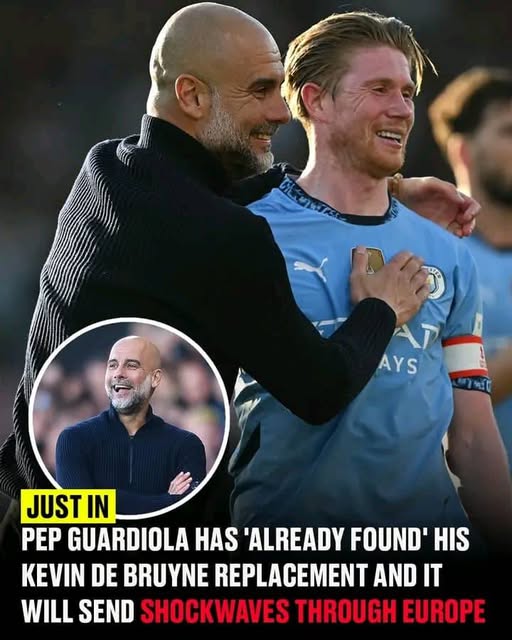Pep Guardiola has ‘already found’ his Kevin De Bruyne replacement for Man City

The football world stands at the precipice of a seismic shift. Manchester City, the dominant force in English football over the past decade, faces one of its most significant challenges yet: replacing the irreplaceable Kevin De Bruyne. The Belgian maestro’s announcement that the 2024/25 season would mark his final chapter at the Etihad Stadium sent reverberations throughout the footballing community, leaving supporters, pundits, and rival clubs alike questioning how Pep Guardiola’s side could possibly fill such an enormous void.
Yet, in the labyrinthine world of modern football transfers, where speculation runs rampant and rumors multiply like wildfire, one name has emerged from the chaos with startling clarity: Florian Wirtz. The 21-year-old German international, currently plying his trade at Bayer Leverkusen, has reportedly captured the attention of Guardiola and Manchester City’s recruitment team as the ideal successor to De Bruyne’s throne. Should this ambitious pursuit come to fruition, it would not merely represent a changing of the guard at Manchester City—it would send shockwaves reverberating across the entire European football landscape.
The End of an Era: Kevin De Bruyne’s Manchester City Legacy
To understand the magnitude of replacing Kevin De Bruyne, one must first appreciate the enormity of his contribution to Manchester City’s unprecedented success. Since his arrival from VfL Wolfsburg in 2015 for a then-club record fee of £55 million, De Bruyne has been the orchestrator-in-chief of City’s golden age. His statistics alone tell a remarkable story: over 380 appearances, more than 100 goals, and well over 170 assists, numbers that place him among the Premier League’s greatest-ever midfielders.
However, De Bruyne’s impact transcends mere statistics. He has been the creative heartbeat of a Manchester City team that has redefined modern football under Guardiola’s stewardship. His ability to thread passes through the eye of a needle, deliver pinpoint crosses from impossible angles, and score spectacular goals from distance has made him indispensable to City’s tactical framework. The Belgian’s vision and passing range have enabled Guardiola to implement his intricate possession-based system with devastating effectiveness.
The 2024/25 campaign has indeed witnessed a noticeable decline in De Bruyne’s performances, a natural consequence of age, accumulated injuries, and the relentless demands of elite football. Despite registering four goals and seven assists in 31 appearances—numbers that would satisfy most midfielders—these figures represent a significant downturn from his peak years when he regularly produced 20+ assists per season. This decline, while disappointing for City supporters, has been expected by those close to the club, who have long anticipated the need for succession planning.
De Bruyne’s emotional farewell message on social media captured the essence of his relationship with Manchester City and its supporters. His words, “This City. This club. These people… gave me EVERYTHING. I had no choice but to give EVERYTHING back! And guess what—we won everything,” encapsulated not just his personal journey but the mutual love affair between player and club. His tenure has coincided with Manchester City’s most successful period, including six Premier League titles, multiple domestic cups, and the club’s maiden Champions League triumph in 2023.
The Belgian’s departure represents more than just the loss of a player; it symbolizes the end of an era. De Bruyne has been the final piece of Guardiola’s initial puzzle, the player who transformed City from a team with potential into unstoppable champions. His exit forces the club to confront a fundamental question: how do you replace the irreplaceable?
Enter Florian Wirtz: The Chosen Successor
In the complex chess game of modern football recruitment, Manchester City’s identification of Florian Wirtz as De Bruyne’s potential successor represents a masterstroke of forward planning. At just 21 years old, Wirtz has already established himself as one of Europe’s most exciting talents, combining technical brilliance with tactical intelligence beyond his years.
Wirtz’s journey to prominence has been nothing short of remarkable. Born in Pulheim, Germany, he joined Bayer Leverkusen’s youth academy at the age of eight and progressed through their ranks with meteoric speed. His professional debut came at just 17, and within months, he had become an integral part of Leverkusen’s first team. His rapid ascension through youth levels for the German national team, culminating in his senior international debut, further underscored his exceptional potential.
The 2024/25 season has been particularly impressive for Wirtz, with nine goals and ten assists in the Bundesliga showcasing his ability to both create and convert opportunities. These numbers, while impressive in isolation, tell only part of the story. Wirtz’s influence on Leverkusen’s play extends far beyond goals and assists; he is the creative fulcrum around which their entire offensive strategy revolves.
What makes Wirtz particularly attractive to Manchester City is his stylistic similarity to De Bruyne. Both players possess exceptional vision, the ability to execute passes that others cannot even envision, and the intelligence to find space in congested areas. Wirtz’s technical ability on the ball, combined with his composure under pressure, mirrors many of the qualities that have made De Bruyne so effective in Guardiola’s system.
However, Wirtz brings additional dimensions that could make him even more suitable for the modern game. His pace and dribbling ability allow him to carry the ball through midfield transitions, something that has become increasingly important in contemporary football. His work rate and defensive contribution also align with Guardiola’s demands for total football, where every player must contribute both offensively and defensively.
Tactical Compatibility: Perfect Fit for Guardiola’s System
Pep Guardiola’s tactical philosophy demands players who can seamlessly integrate into his complex positional play system. De Bruyne’s success at Manchester City has been largely due to his ability to understand and execute Guardiola’s tactical concepts, particularly his role as the primary creative outlet in the team’s possession-based approach.
Wirtz’s playing style suggests he could adapt seamlessly to Guardiola’s demands. His positioning intelligence, particularly his ability to find pockets of space between opposition lines, mirrors De Bruyne’s tactical awareness. Wirtz’s passing range, while still developing, already shows the variety needed to unlock defensive systems—from delicate through balls to defense-splitting passes across the pitch.
The German’s versatility also appeals to Guardiola’s preference for tactically flexible players. Wirtz has demonstrated competence in multiple positions across the attacking midfield and forward lines, capable of playing as a traditional number 10, a false nine, or even drifting to wide areas when tactical situations demand. This positional fluidity would allow Guardiola to maintain the tactical unpredictability that has been crucial to Manchester City’s success.
Furthermore, Wirtz’s age represents a significant advantage. At 21, he possesses the physical and mental capacity to handle Guardiola’s intensive training methods and tactical demands. His youth also means he can be molded according to City’s specific requirements, potentially developing into an even more complete player than his predecessor.
The Financial Battlefield: Competing for Europe’s Hottest Property
The pursuit of Florian Wirtz promises to be one of the most fiercely contested transfer battles in recent memory. Bayer Leverkusen’s valuation of over £85 million reflects not just Wirtz’s current ability but his immense potential for future development. This figure, while substantial, represents reasonable value in today’s inflated transfer market, particularly for a player of Wirtz’s caliber and age profile.
Manchester City’s financial might gives them significant advantages in any transfer pursuit. The club’s revenues, bolstered by success on the pitch and commercial partnerships, provide the financial flexibility needed to compete for world-class talent. City’s track record of developing young players and providing platforms for career advancement also strengthens their position in negotiations.
However, the competition for Wirtz’s signature promises to be intense. Bayern Munich’s interest represents a significant threat, particularly given their appeal to German players and their history of successful transitions from the Bundesliga. The Bavarian giants’ need for midfield rejuvenation, following the aging of their core players, makes Wirtz an obvious target.
Real Madrid’s reported interest adds another layer of complexity to the transfer saga. The Spanish giants’ prestige and history of attracting world-class talent cannot be underestimated. Their recent success in the Champions League and their ability to offer players the chance to compete for the sport’s most prestigious trophies could prove decisive factors.
Manchester City must also consider the player’s personal preferences and career ambitions. While City can offer immediate opportunities for silverware and development under one of football’s greatest coaches, other factors such as playing style preferences, family considerations, and long-term career goals will influence Wirtz’s decision.
Strategic Implications: City’s Youth-Focused Transfer Policy
The potential signing of Florian Wirtz aligns perfectly with Manchester City’s evolving transfer strategy. Recent acquisitions such as Omar Marmoush, Abdukodir Khusanov, and Nicolás González demonstrate the club’s commitment to reducing the average age of their squad while maintaining competitive standards.
This youth-focused approach serves multiple strategic purposes. Financially, younger players typically offer better long-term value, with potential for appreciation rather than depreciation. Tactically, younger players tend to be more adaptable to new systems and more willing to embrace the intensive demands of Guardiola’s coaching methods.
The strategy also addresses the natural aging of City’s core squad. Players like De Bruyne, while still effective, represent the old guard of Guardiola’s initial Manchester City project. The integration of younger talents ensures continuity and prevents the kind of dramatic transition periods that can derail successful teams.
Wirtz’s potential arrival would also send a strong message about Manchester City’s continued ambitions. In an era where financial fair play regulations and increased competition challenge traditional powerhouses, securing one of Europe’s most coveted young talents would demonstrate City’s ability to remain at the forefront of global football.
Developmental Pathway: Learning from the Guardiola Academy
Should Wirtz join Manchester City, he would enter one of football’s most sophisticated development environments. Guardiola’s track record of improving players, particularly creative midfielders, speaks for itself. Players like David Silva, Kevin De Bruyne, and Bernardo Silva have all reached new heights under the Catalan coach’s guidance.
The Manchester City academy and training facilities provide an ideal environment for young talent development. The club’s investment in sports science, tactical analysis, and psychological support creates conditions where players can maximize their potential. Wirtz would benefit from working alongside some of football’s most experienced professionals while receiving guidance from coaching staff renowned for their expertise.
Guardiola’s coaching methods, while demanding, have consistently produced improved performances from his players. His attention to tactical detail, combined with his ability to simplify complex concepts, would help Wirtz develop the understanding needed to excel at the highest level. The German’s existing technical ability provides a strong foundation upon which Guardiola could build.
The presence of experienced players like Bernardo Silva, Ilkay Gündogan (should he remain), and other established professionals would provide Wirtz with ideal mentors. Learning from players who have successfully adapted to Guardiola’s system would accelerate his development and integration into the team.
European Ramifications: The Domino Effect
Manchester City’s successful pursuit of Florian Wirtz would trigger significant reactions across European football. The signing would immediately strengthen City’s already formidable squad while potentially weakening competitors who miss out on the German’s signature.
Bayern Munich’s failure to secure Wirtz would force them to identify alternative targets, potentially triggering a cascade of transfer moves across the continent. Their pursuit of other creative midfielders could disrupt the plans of clubs lower in the football hierarchy, creating opportunities and challenges throughout the European transfer market.
Real Madrid’s reaction to missing out on Wirtz could lead them to pursue other high-profile targets, potentially triggering moves that reshape the competitive landscape. The Spanish giants’ ability to attract world-class talent means their alternative pursuits could significantly impact other major clubs.
The ripple effects would extend beyond individual transfers. Other clubs would need to assess their own recruitment strategies, potentially leading to increased investment in youth development or alternative approaches to squad building. The message that Manchester City remains capable of securing the world’s best young talent would influence how competitors approach their own strategic planning.
Challenges and Obstacles: The Road to Completion
Despite Manchester City’s advantages, securing Florian Wirtz’s signature presents significant challenges. Bayer Leverkusen’s reluctance to sell their star asset, particularly mid-career trajectory, represents the primary obstacle. The German club’s Champions League qualification and domestic success reduce their financial pressure to sell, strengthening their negotiating position.
Wirtz’s personal preferences remain unknown, and his decision will ultimately determine the transfer’s success. Factors such as playing time guarantees, role within the team, and alignment with personal career goals will influence his choice. Manchester City must convince him that their project offers the best platform for his continued development.
The financial implications extend beyond the transfer fee. Wirtz’s wage demands, agent fees, and additional contractual requirements could significantly inflate the total cost. Manchester City must balance their desire to secure the player with financial responsibility and adherence to regulatory frameworks.
Competition from other elite clubs ensures that City cannot assume success. Bayern Munich’s appeal to German players and Real Madrid’s global prestige create compelling alternative options for Wirtz. Manchester City must present a superior package that addresses both financial and sporting considerations.
Long-term Vision: Building the Next Dynasty
The potential acquisition of Florian Wirtz represents more than a simple replacement for Kevin De Bruyne; it symbolizes Manchester City’s commitment to sustained excellence. Building around young, world-class talent like Wirtz positions the club for continued success beyond Guardiola’s eventual departure.
Wirtz’s age profile aligns with other key City players, creating the foundation for a new generation of Manchester City stars. His integration alongside players like Erling Haaland, Phil Foden, and other young talents could establish the core of City’s next dynasty.
The signing would also demonstrate Manchester City’s evolution from nouveau riche challengers to established European aristocracy. Competing successfully for the world’s most coveted young talents against historical powerhouses like Real Madrid and Bayern Munich would represent a significant milestone in the club’s development.
Conclusion: The Dawn of a New Era
Manchester City’s pursuit of Florian Wirtz as Kevin De Bruyne’s successor represents a defining moment in the club’s history. The potential transfer encompasses far more than replacing one player with another; it symbolizes the continuous evolution of a footballing powerhouse determined to maintain its position at the sport’s summit.
Wirtz’s combination of technical ability, tactical intelligence, and developmental potential makes him the ideal candidate to inherit De Bruyne’s creative responsibilities. His age and playing style suggest he could not only replace the Belgian’s contributions but potentially exceed them as he develops under Guardiola’s guidance.
The transfer battle for Wirtz’s signature promises to be one of the summer’s most compelling sagas. Manchester City’s financial resources, tactical suitability, and development reputation position them favorably, but competition from Bayern Munich and Real Madrid ensures nothing can be taken for granted.
Should Manchester City successfully secure Wirtz’s services, the signing would indeed send shockwaves through European football. It would demonstrate the club’s continued ability to attract world-class talent while providing the foundation for sustained success in the post-De Bruyne era.
The departure of Kevin De Bruyne marks the end of one of Manchester City’s greatest chapters, but the potential arrival of Florian Wirtz could herald the beginning of an even more spectacular story. In the ever-evolving narrative of European football, Manchester City’s pursuit of Wirtz represents their commitment to writing the next chapter of their remarkable journey.
As the summer transfer window approaches, all eyes will focus on this pivotal moment in Manchester City’s history. The successful acquisition of Florian Wirtz would not only secure the club’s immediate future but establish them as the preeminent destination for world football’s brightest talents. The stakes could not be higher, and the implications could not be more far-reaching.















